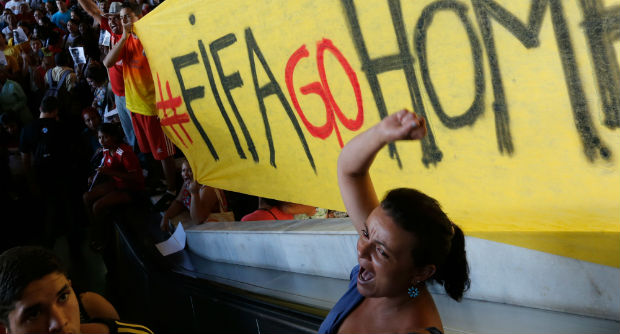
In this May 27, 2014 photo, a demonstrator shouts slogans against FIFA during a protest against FIFA World Cup, at a bus station in Brasilia, Brazil. With 10 days until the World Cup begins, Brazil was rushing Monday to finish installing seats in stadiums and to deal with threats ranging from violent protests to dengue fever. AP
BRASÍLIA–With 10 days until the World Cup begins, Brazil was rushing Monday to finish installing seats in stadiums and to deal with threats ranging from violent protests to dengue fever.
The countdown to kick-off has been marred by protests–from striking drivers who abandoned their buses mid-route to indigenous leaders in bright-feathered headdresses shooting arrows at police.
Anger over the more than $11 billion being spent on the event has raised fears of a return to the violence seen last year during the Confederations Cup, a World Cup dress rehearsal.
Then, clashes erupted as one million people flooded the streets calling for more money for social programs and less for stadiums.
But recent protests have been smaller, with journalists and street vendors sometimes outnumbering the crowds of anti-government demonstrators chanting: “There won’t be a World Cup!”
Public support slide
An Ibope Inteligencia opinion poll published Monday showed public support for the event had slid from 58 percent in February to 51 percent in May, with 42 percent saying they oppose the Cup.
But 71 percent hoped the competition would be a success compared with 11 percent who prefer to see it fail.
In a country that takes pride in its five World Cup titles, the tournament is starting to unleash growing excitement, with media providing exhaustive coverage of the Brazilian team’s training camp.
FIFA under scrutiny
President Dilma Rousseff joined FIFA president Sepp Blatter Monday for a ceremony to present the World Cup trophy.
But it was overshadowed by new allegations that FIFA officials took bribes to name Qatar the 2022 World Cup hosts.
Blatter and FIFA secretary general Jerome Valcke both dodged questions on the controversy.
Asked if he was in favor of holding a new bidding process for 2022, Blatter said: “I am speaking about the World Cup in Brazil and it will be a wonderful Cup in Brazil. Let’s live up the emotions.”
Rousseff for her part vowed Brazil had all the necessary infrastructure and security in place.
“We know we’re ready. The stadiums are ready,” she said. “And the fans who already know these venues know they’re modern, comfortable and safe.”
But on the ground, workers were still scrambling to finish the stadiums in Sao Paulo, Curitiba, Cuiaba, Natal and Porto Alegre.
The Corinthians Arena in Sao Paulo, which will host the opening ceremony and first match between Brazil and Croatia, held a hastily scheduled second test event Sunday but is still under construction.
Temporary seating areas for 20,000 fans–delayed after a worker fell to his death, one of eight construction accident fatalities at stadiums– have still not received safety clearance from firefighters.
The original deadline for all 12 stadiums was Dec. 31.
Organizers have shelved much of the other infrastructure they had promised, from roadworks to a high-speed train to subway and monorail lines.
Football legend Ronaldo, a member of Brazil’s World Cup organizing committee, admitted last week that only 30 percent of the planned projects would be completed.
Rio Mayor Eduardo Paes warned tourists not to expect Brazil to be like home.
“People who arrive in Brazil imagining they’re in England or who arrive in Rio imagining they’re in London will have a frustrating experience in terms of development,” he said.
“Rio is a city that doesn’t hide its poorest people like other places.”
High stakes
Brazil will have 157,000 police and soldiers providing security during the tournament.
But recent police strikes–and threats of more during the tournament–have raised security fears in a country with one of the world’s worst crime rates.
The stakes are high for Rousseff, who is up for re-election in October.
The leftist leader is leading in the polls, but her top rivals have been consolidating their support.
Analysts say the results on the pitch will probably not affect her chances.
But if the Brazilian team loses, the tournament may do little to lessen public anger over the money spent hosting it.
Public health officials are meanwhile scrambling to fend off a threat to Cristiano Ronaldo’s Portugal and John Mikel Obi’s Nigeria, whose base camps will be in Campinas.
The southeastern city is in the middle of the worst dengue fever outbreak in its history.
Sanitation workers are spraying for mosquitos, which carry the tropical virus.
But health officials recommend players cover up and wear insect repellent just in case.–Moises Avila
RELATED STORIES
Brazil fights sex tourism, child prostitution ahead of World Cup
Brazil holds final stadium tests for World Cup

